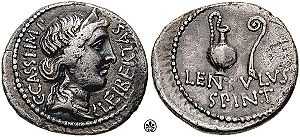Liberty (goddess)
A goddess named for and representing the concept Liberty has existed in many cultures, including classical examples dating from the Roman Empire to those representing national symbols such as the American Columbia and its Statue of Liberty, an artwork created under the name Liberty Enlightening the World, and the French Marianne.
Classical examples

The ancient Roman goddess Libertas was honored during the second Punic War by a temple erected on the Aventine Hill in Rome by the father of Tiberius Gracchus. A statue in her honor also was raised by Clodius on the site of Marcus Tullius Cicero's house after it had been razed. The figure bears certain resemblances to Sol Invictus, the late Roman Republic sun deity and the crown often associated with that deity often appears in modern depictions of Liberty.
Neoclassical references
In 1793, during the French Revolution, the Notre Dame de Paris cathedral was turned into a "Cult of Reason" and, for a time, "Lady Liberty" replaced the Virgin Mary on several altars.
Depictions in the United States
In the United States, "Liberty" often is depicted with five-pointed stars, as appear on the American flag, usually held in a raised hand. Another hand may hold a sword pointing downward. Depictions familiar to Americans include the following:
- The monumental Statue of Liberty, created as "Liberty Englightening the World", its replicas, and its portrayal on a number of postage stamps.
- Many denominations of American coins have depicted Liberty in both bust side-view and full-figure designs; see also Seated Liberty dollar
- The flags of the States of New York and New Jersey (along with various signs and government-owned items bearing the Seal of New Jersey)
- On the dome of the U.S. Capitol as Freedom
- On the dome of the Georgia State Capitol as Miss Freedom
- On the dome of the Texas State Capitol
- On the dome of the Allen County Courthouse in Fort Wayne, Indiana
- On the dome of the Bergen County Courthouse in Hackensack, New Jersey[1]
- On both Union and Confederacy currency
See also
References
- ↑ "Places We Call Home: Hackensack, N.J.". FDU Magazine. Fall 2001. Retrieved 2008-11-04.
External links
- Texas Memorial Museum
- Texas statue
- Bee county courthouse in Texas
- Another article on Beeville courthouse
- Mackinac Island
| |||||||||||||||||||||